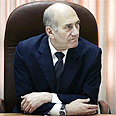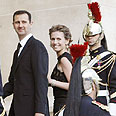

PM accuses 'political rival' of communicating with Assad
Olmert tells Foreign Affairs and Defense Committee "there are those in Israel seeking informal contact with the Syrians." State officials tell Ynet prime minister's words aimed at senior politicians he accuses of trying to signal Damascus it should wait for new Israeli PM before signing peace deal
Prime Minister Ehud Olmert told the Knesset Foreign Affairs and Defense Committee on Monday morning that Israeli public figures may be trying to circumvent official negotiations with Syria.
"I have heard there are those in Israel who are seeking informal contact with the Syrians, and I hope this is something that does not go through… It needs to be done only through the main negotiations," he said.
Olmert chose not to disclose the identities of those he accused of undermining his government's talks with Damascus.
"The negotiations undoubtedly created certain options for the Syrians that weren't there before. They are still smaller in scope than some of those who criticize the government allege they are," Olmert said.
Ynet has determined the prime minister was not referring to voluntary efforts, such as that led by the former director-general of the Ministry of Foreign Affairs, Dr. Alon Liel, but rather his political rivals.
Diplomatic sources familiar with the recently renewed negotiations with Syria told Ynet that Olmert's words were aimed towards senior Israeli politicians who have apparently signaled to Syrian President Bashar Assad through various channels that he should put the talks on the backburner until Olmert is replaced, perhaps even until after the general elections in Israel.
Then – the unnamed political operatives told Assad – with them in power, a peace agreement can be reached between the two countries.
Talks still heavily mediated
The officials noted several figures who may have been involved in the informal contact.
The indirect negotiations between Jerusalem and Damascus are being mediated by Turkey. Turkish Foreign Minister, Ali Babacan, recently said the fourth round of talks would take place "in a few weeks." It remains unclear when the negotiations will become direct.
In a television interview with NTV, Babacan said: "The talks so far took place in a sincere and constructive atmosphere. Our prevailing opinion is that both parties have a genuine political will to reach a settlement."
Assad himself said in recent weeks that there is little chance of the talks moving to a direct channel before a new administration is elected in Washington.
Speaking to Arab satellite channel Al-Jazeera, Assad said Damascus would establish "normal" relations including the opening of embassies if a peace accord was sealed with Israel,
"From the very start of the peace process, we have been speaking of normal relations" he said.















